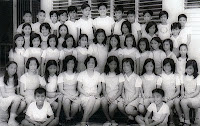I remember waking up and being told that were no classes that day, September 23, 1972, a Friday I think. We were not allowed to go out and check with our schoolmates/ neighbors. The streets were deserted anyway. No one knew what was going on. There were bombings and rallies going on the past weeks. Talks were rife that classes will be suspended until the end of the schoolyear. We were initially overjoyed but got immediately terrified when told that we may have to repeat the grade when school reopens.
The TV channels were cut off. When Marcos appeared on-screen with his "I hereby declare" speech, people confirmed what was whispered in hush-hush tones. After which, only one channel operated and all it showed was Maribeth Bichara gyrating in skimpy clothes, alternating with Sahlee Quizon and Sonny Cortez singing something about sugar.
I'm sure my classmates can fill up my fading memories of how things were. These days we also have insurgency, bombings, journalists/activists missing/getting killed, corruption, military in the bureaucracy, poverty, efforts to change the charter, and more recently spying on the academe. Jun Cruz Reyes was my Filipino literature instructor in high school while Bien Lumbera was my professor in Pilipino 41 (an elective course - Critical Thinking) in college.
 Alex Magno refuses to see the parallels between the situation then and now. But Winnie Monsod believes we are still haunted by Marcos' martial law, enumerating the problems that hound us up to this day.
Alex Magno refuses to see the parallels between the situation then and now. But Winnie Monsod believes we are still haunted by Marcos' martial law, enumerating the problems that hound us up to this day.While Alex Magno insists that dictatorship is impossible at this time, it is not dictatorship per se that bothers us. It is the damage being done to the institutions just to perpetuate oneself in power. It is to that that we say never again.













